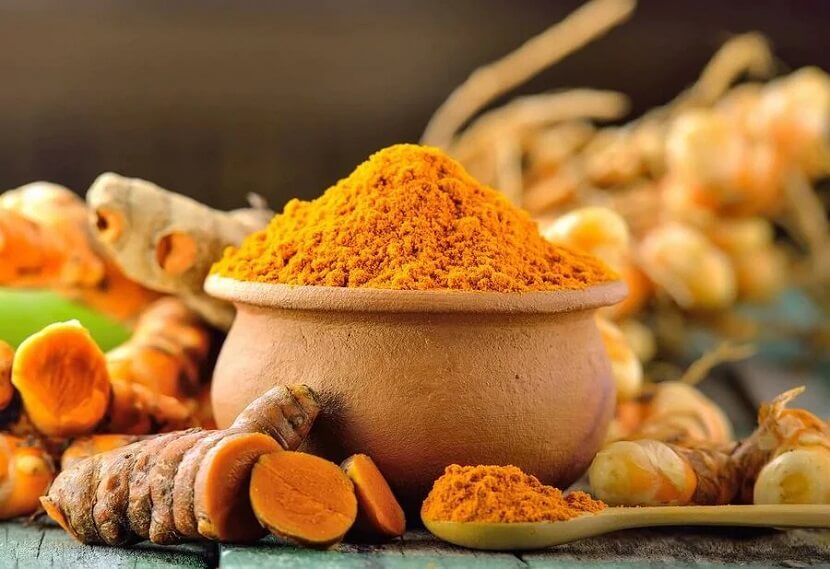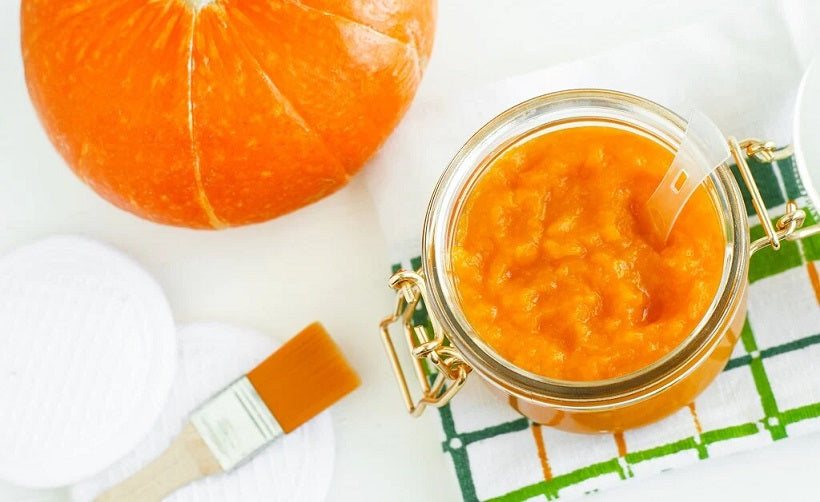Most people are familiar with Turmeric; the ancient Ayurvedic medicinal root is a rich yellow colour and arguably one of the most powerfully healing spices on the planet. If you’ve eaten curry, you’ve consumed turmeric. It’s the ingredient that gives curry its spicy flavour and vibrant hue.
Turmeric is known as Curcuma longa in the alternative medicine industry and is often referred to as ‘The Golden Spice of Life’. It has been used throughout the centuries to treat various ailments and improve overall vitality. In modern times it has become popular as a natural anti-inflammatory, but it bestows benefits that extend well beyond this, and we are going to delve into them below.
Health Benefits of Turmeric

1. Turmeric can heal inflammatory conditions
The active ingredient in turmeric is known as Curcumin, and it’s what all the anti-inflammatory research is focused on.
Using turmeric to down-regulate inflammation can mean less stiffness, fluid retention, aches, pains, joint soreness, and freedom from symptoms related to asthma, arthritis, and allergies. It does this by inhibiting something called arachidonic acid, which promotes healing and prevents damage to surrounding tissues. This action means turmeric can be used for a wide range of acute and chronic inflammatory conditions, including RSI, sports injuries, muscle sprains and menstrual pain.
2. Turmeric can help digestive issues
Turmeric is officially recognised as an alternative therapy for gastrointestinal problems. It’s said to have potent antiviral and antibacterial properties which make it helpful for gut infections and ulcers, not only those disorders caused by inflammation such as gastritis, ulcers, colitis and inflammatory bowel disease. Another bonus is that turmeric has been found to prevent esophageal inflammation and damage from using non-steroidal anti-inflammatory drugs used for reflux.
It is estimated that 90 percent of the body's serotonin is made in the digestive tract which also makes it a must-have for conditions like Irritable Bowel Syndrome that are associated with stress and anxiety.
3. Turmeric can boost mood
Mental health conditions like depression and anxiety have been associated with increased inflammation, cortisol levels, digestive issues and dysregulation of the communication lines between our brain and our stress glands (aka the hypothalamic-pituitary-adrenal (HPA) axis).
Studies have shown that Turmeric can balance cortisol (our stress hormone), improve serotonin (our happy hormone) and even enhance an enzyme that antidepressants influence, making it a safe alternative to conventional mood boosters.
4. Turmeric for skin
Curcumin is what’s known as a polyphenol, and our skin LOVES polyphenols! This makes it the ideal herb to heal skin conditions and reduce premature aging both topically and internally. Who doesn’t want that?!
Skin issues that can benefit from turmeric supplementation include Acne, rosacea, alopecia, atopic dermatitis, wrinkles, oral lichen planus (inflammation of the mouth mucous membranes), pruritus (itchy skin), psoriasis and radiodermatitis. It does this thanks to it it’s powerful anti-inflammatory, antimicrobial and antioxidant properties. Want to know more? Get in-depth info about turmeric and skin here.

5. Turmeric for detoxification
Oxidative stress is considered a key causative factor to liver damage. Turmeric helps to protect the liver against free radicals, environmental toxins, pollutants, alcohol and other waste products. It also supports our natural detoxification capacity. In fact, it specifically enhances certain enzymes linked to antioxidants in the body as well as boosting endogenous antioxidants like vitamin C.
This antioxidant effect appears to be so powerful that it can stop your liver from being damaged by toxins like medications and alcohol, which is wonderful news for those who have no choice but to use life-saving medications that hurt the liver with long-term use. This means it is also beneficial to the consequential progression of liver injury, non-alcoholic steatohepatitis, non-alcoholic liver disease, liver fibrosis and cirrhosis.
6. Turmeric as an antioxidant
The antioxidant powers of Turmeric mentioned above can be increased six-fold when turmeric is fermented or combined with black pepper. Pretty amazing!
When naturally occurring antioxidants are consumed in the diet, such as through turmeric, then the body's own internal antioxidant systems are spared. When the levels of these antioxidants such as glutathione peroxidase and superoxide dismutase rise, it triggers a known yet extremely important mechanism in the body. The body will start to use these antioxidants to heal and repair itself.
Often these antioxidants protect the body from your usual intake of toxins from the diet, lifestyle and normal metabolism. Still, when turmeric enters the body, these antioxidants are spared and can go to work healing and repairing other areas. It is what we call the body's innate ability to heal itself. More potent than any doctor or drug. If you can combine this effect with an alkaline diet, then it is supercharged; and deep healing and balancing can occur.
7. Turmeric for hormonal issues
There is a growing body of evidence suggesting that curcumin may exert potential anti-oestrogen and anti-androgen (male hormone) activity which could be a game changer for those with hormonal imbalances, polycystic ovarian syndrome, oestrogen dominant conditions (fibroids, hyperplasia, endometriosis etc) and symptoms of PMS like painful and irregular cycles, low mood, bloating and fluid retention. We also know that turmeric possesses warming qualities that most certainly help with pelvic congestion and cramping.
The other three properties which make turmeric so remarkable for hormonal balance and fertility are its anti-inflammatory, antioxidant, and liver detoxifying actions. For most hormonal issues, there are usually a set of underlying factors which impact these areas significantly. To find out if your symptoms are a result of this, take our FREE hormonal assessment.
8. Cardiovascular health
Having a high antioxidant status can help keep cholesterol and blood lipids within the healthy range. We now know that turmeric is a master at raising antioxidants within the body. Win!
Scientific research has also demonstrated anti-thrombotic (prevents blood clotting) and cardiovascular protective effects with turmeric. In fact, it has been shown to reduce cardiotoxicity (when the heart muscle is injured) and may prevent diabetic cardiovascular complications. Pretty amazing!
The anti-thrombotic, anti-proliferative, and anti-inflammatory effects of curcumin and the effect it has on decreasing cholesterol levels mean it could also protect against the nasty changes that come with atherosclerosis, abnormal enlargement or thickening of the heart muscle, AND arrhythmias. Do you or a loved one have heart issues? It might be time to get them onto some turmeric!
9. Turmeric can manage diabetes, improve insulin resistance and normalise blood sugars.
A 2013 review of studies suggests that Curcumin can decrease the level of glucose in the blood and prevent diabetes and diabetic-related complications. This is big news for those with unstable blood sugar levels and to make their type 2 diabetes more manageable. Diabetic patients often also suffer liver issues such as fatty liver or cirrhosis, in which case turmeric could kill two flies with one slap!
As our blood sugar level plays an important role in how we metabolize food and use it for energy, let’s delve quickly into the next benefit, which is all about fat loss.
10. Turmeric can assist with fat loss
Who knew that curcumin can promote weight loss, reduce fat tissue growth, curb weight regain, and enhance our sensitivity to insulin! And yes, the research is there to support it. It seems there truly is a reason for its nickname, ‘the wonder drug’.
What’s more, a month-long study on turmeric supplementation found 44 people who were previously unable to lose weight saw significant reductions in body weight, body mass index (BMI), and waist and hip circumference. They also saw increased levels of adiponectin, a hormone that helps regulate your metabolism!
Being anti-inflammatory, curcumin may also suppress particular inflammatory markers that play a role in obesity. These markers are typically elevated in people with excess weight. If you dig even deeper, the recent scientific research reveals that curcumin directly interacts with white adipose (fat) tissue to suppress chronic inflammation and leptin, which is our hunger hormone! Wow!
Final thoughts
After all that, it’s hard not to be convinced by the power of this medicinal root and that is why we took the time to create our own turmeric supplement.
What makes our concoction different is that we not only added black pepper for 2000x the absorption; we also fermented it creating a tasty, potent liquid that not only provides the amazing 10 benefits listed above but also improves our microbiome (the colony of bugs that live within our body). This, in turn, has a positive effect on immunity, digestion and mood.
Happy Turmeric is gluten-free, 99% sugar-free, lactose-free, vegan friendly, and contains no detectable alcohol.
Want to know some other great ways to have turmeric?
- Pop it in a smoothie
- Add it to your curry
- Try out some superfood balls
- Make a turmeric latte
- Whip up some turmeric rice
- Warm up with some winter soup
- Make an immune tonic
Our suggestion is to first take our FREE Online Assessment to understand if hormones may be playing a role in your health issues.
In Short: The Top 10 Benefits of Turmeric
Turmeric, also known as the “Golden Spice of Life,” is one of the most powerful natural remedies for inflammation, digestion, hormonal balance, and overall vitality. Its active compound, curcumin, provides wide-ranging benefits that support the immune system, heart health, metabolism, and even mood. Supplementing with high-quality turmeric, like Happy Turmeric, can amplify these effects naturally.
Key Takeaways
- Anti-inflammatory – Helps reduce stiffness, joint pain, muscle aches, and menstrual discomfort.
- Digestive support – Eases gastritis, ulcers, reflux, IBS, and inflammatory bowel issues.
- Mood booster – Balances cortisol, supports serotonin, and may reduce anxiety and depression.
- Skin health – Antioxidant and antimicrobial properties improve acne, rosacea, psoriasis, and ageing.
- Liver detox – Protects against toxins, alcohol, and medication-related liver stress.
- Powerful antioxidant – Enhances the body’s own antioxidant systems and natural repair processes.
- Hormonal balance – Supports PMS, PCOS, oestrogen dominance, and reproductive health.
- Heart health – Improves cholesterol, prevents clotting, and protects cardiovascular function.
- Blood sugar support – Improves insulin resistance, stabilises glucose, and aids diabetes management.
- Weight management – Promotes fat loss, regulates appetite, and reduces inflammatory markers linked to obesity.
Adding turmeric or curcumin supplements like Happy Turmeric to your daily routine supports immunity, digestion, hormonal health, and natural inflammation relief.
REFERENCES
Mohajeri et al. (2020). Curcumin: a phytochemical modulator of estrogens and androgens in tumors of the reproductive system. Pharmacological Research. Jun;156:104765.
Farzaei et al. (2018). Curcumin in Liver Diseases: A Systematic Review of the Cellular Mechanisms of Oxidative Stress and Clinical Perspective. Nutrients. 10(7):855.
Teich et al. (2017). Curcumin limits weight gain, adipose tissue growth, and glucose intolerance following the cessation of exercise and caloric restriction in rats. Journal of Applied Physiology (1985). Dec 1;123(6):1625-1634.
Akbari et al. (2019). The Effects of Curcumin on Weight Loss Among Patients With Metabolic Syndrome and Related Disorders: A Systematic Review and Meta-Analysis of Randomized Controlled Trials. Frontiers in Pharmacology. Jun 12;10:649.
Gupta SC, Patchva S, Aggarwal BB. (2013). Therapeutic roles of curcumin: lessons learned from clinical trials. The AAPS Journal. 15(1):195-218.
Bradford PG. (2013). Curcumin and obesity. BioFactors. Jan-Feb;39(1):78-87.
Sharifi-Rad et al. (2020). Turmeric and It's Major Compound Curcumin on Health: Bioactive Effects and Safety Profiles for Food, Pharmaceutical, Biotechnological and Medicinal Applications. Frontiers in Pharmacology. 11: 01021.
Kocaadam B & Şanlier N. (2015). Curcumin, an active component of turmeric (Curcuma longa), and its effects on health. Critical Reviews in Food Science and Nutrition. Sep 2;57(13):2889-2895.
Labban L. (2014). Medicinal and pharmacological properties of Turmeric (Curcuma longa): A review. International Journal of Pharma and Bio Sciences. 5(1):17-23.
Mata et al. (2020). Benefits of turmeric supplementation for skin health in chronic diseases: a systematic review. Critical Reviews in Food Science and Nutrition. Jul 27;1-15.
O’Neill CA, Monteleone G, McLaughlin JT, Paus R. (2016). The gut-skin axis in health and disease: A paradigm with therapeutic implications. BioEssays. Nov;38(11):1167-1176.
Salem I, Ramser A, Isham N, Ghannoum MA. (2018). The Gut Microbiome as a Major Regulator of the Gut-Skin Axis. Frontiers in Microbiology. 9: 1459.
Yadav RP, Tarun G. (2017). Versatility of turmeric: A review of the golden spice of life. Journal of Pharmacognosy and Phytochemistry. 6(1):41-46.
Li et al. (2020). Curcumin, the golden spice in treating cardiovascular diseases. Biotechnology Advances. Jan-Feb;38:107343.
Wongcharoen W & Phrommintikul A. (2009). The protective role of curcumin in cardiovascular diseases. International Journal of Cardiology. Apr 3;133(2):145-51.










Leave a comment
This site is protected by hCaptcha and the hCaptcha Privacy Policy and Terms of Service apply.